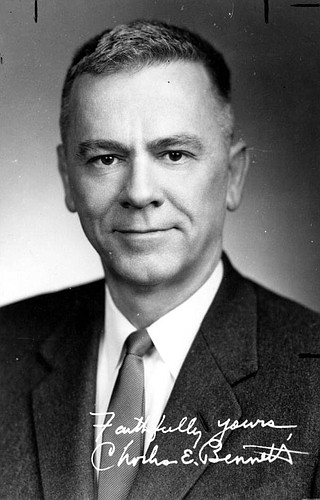
History often repeats, and there often are parallels between the news of today and 50 years ago. Here are some of the top news stories of this week in 1967 compiled from the Jacksonville Public Library’s periodical archives by Associate Editor Max Marbut.
U.S. Rep. Charles Bennett of Jacksonville testified before the House Ethics Committee and said the panel should establish a standard of behavior for members of Congress and the power to enforce it.
He also recommended in the House Committee on Standards of Official Conduct that it approve a disclosure law to fully reveal members’ sources of funds and a code of ethics with penalties for violations.
Bennett was sponsoring a bill to require full disclosure of financial resources of members. “Wherever possible, prescribed behavior of a member of Congress should be placed in statutes enforceable in courts of law, with specific penalties set out in the statutes,” he said.
City Council decided the Haydon Burns Public Library, Downtown at Adams and Ocean streets, would continue to be known by that name, but deferred action on a committee recommendation that names of other living people be removed from public buildings.
The action left open the possibility that four other municipal structures might carry different names in the future.
The facilities in question were the George Robinson Sr. Sports Complex, the Lemuel Sharp branch library, the Dallas Thomas Park and Marina and the Brad Tredinnick Youth Center.
Tredinnick, a former council member, had several months earlier asked the council to remove his name because he did not feel public structures should be named for the living.
Council retained its right to change the name of the other building because Robinson, former head of the Gator Bowl, Sharp, a former council member, and Thomas, a former city commissioner, had been indicted by the Duval County grand jury on charges of accepting bribes and theft.
Mayor Hans Tanzler, at the weekly meeting of the Rotary Club of South Jacksonville at the Green Turtle Restaurant, said the entire nation was watching Jacksonville.
“We are truly on the brink of greatness. Jacksonville is a sleeping giant just ready to burst forth,” he said. “A lot of you thought old Cowford was going to stay old Cowford, but the people here stood up and rejected slogans such as ‘vote no for metro,’” he said, referring to the original name for Jacksonville and the recent approval by voters of consolidation of city and county governments.
Albeit tongue-in-cheek, the state House of Representatives overwhelmingly voted in favor of a proposed amendment to the state constitution that would authorize public floggings.
Rep. Kent McKinnley, R-Sarasota, said he proposed the amendment “in all sincerity.”
He called for a “whipping post in each county” at which every convicted felon would be flogged in accordance with a judge’s determination.
“This isn’t play. I’m being very serious. It’s part of the war on crime,” said McKinnley, a retired newspaper publisher.
He said two states that permitted floggings — Delaware and Virginia — had used the practice to substantially reduce crime.
McKinnley further stated the practice would “reverse the tendency of the courts to make egomaniacs out of criminals.”
Rep. Joseph Kennelly, D-Jacksonville, proposed that an admission be charged “with the proceeds remitted to the counties for the relief of ad valorem taxes.”